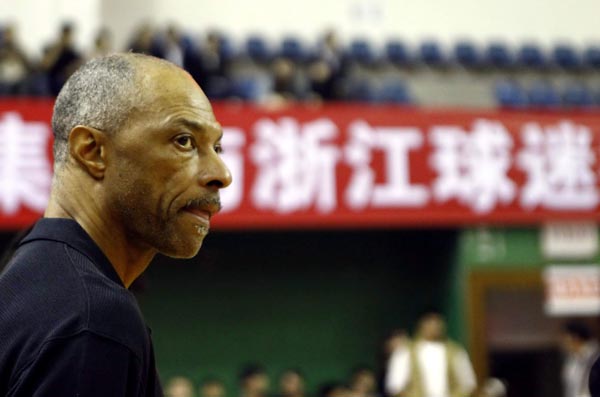Foreign basketball coaches face trying times
 0 Comment(s)
0 Comment(s) Print
Print E-mail China Daily, March 21, 2012
E-mail China Daily, March 21, 2012
Even so, Goorjian finds one of his key strengths as a coach an intuitive ability to connect with players on a personal level rendered useless.
"I'll say 'Hey, let's me and you go have a cup of coffee,' and then I go sit down and I find out that he's got a problem at home with his wife, or he's been thrown out of the house, or the kid's upset," Goorjian said. "You find something out like that. Or 'Hey coach, you've been in me too much, I'm losing my confidence' that kind of conversation. That person wouldn't say it to me if there was another person involved and I wouldn't ask those questions."
On the court, the language barrier can eat at a coach's ability to convey the nuance and emotion of his message, and that's assuming the correct message is even being sent.
"If I want to say (to the interpreter) that you need to tell this kid he needs to get back on defense, and it's three times in a row - and then the guy turns around and says it in a polite (manner). Or maybe he turns around and says 'This guy doesn't know what he's talking about," Goorjian said. "When I talk to the other Western coaches, they'll say (the same thing). Based on the kid's reaction, I don't know if (the interpreter) is saying what I said."
 |
|
Jim Cleamons was head coach of the Zhejiang Lions this season. |
Cleamons, whose former jobs include time as an assistant at the Los Angeles Lakers under Phil Jackson and head coach of the Dallas Mavericks, worked with an interpreter while conducting coaching clinics in Japan some years ago, and says he learned a few tricks. He aims for a specific rhythm and cadence in his speech that he hopes is universally understood, and tailors his instruction to be less technical and more broad.
A competent interpreter is, of course, just as important to the players. Beijing Ducks guard Stephon Marbury is a vocal presence in practice and games. He credits his team's interpreter with easing the transition. "We have a great interpreter who really understands basketball, and him understanding the game makes it so much easier to get my point across," he said.
'The mule gets tired'
Del Harris was as successful as any foreign coach has been in China. He led the national team to eighth-place finish in the Olympics in Athens in 2004, and helped modernize the game.






Go to Forum >>0 Comment(s)